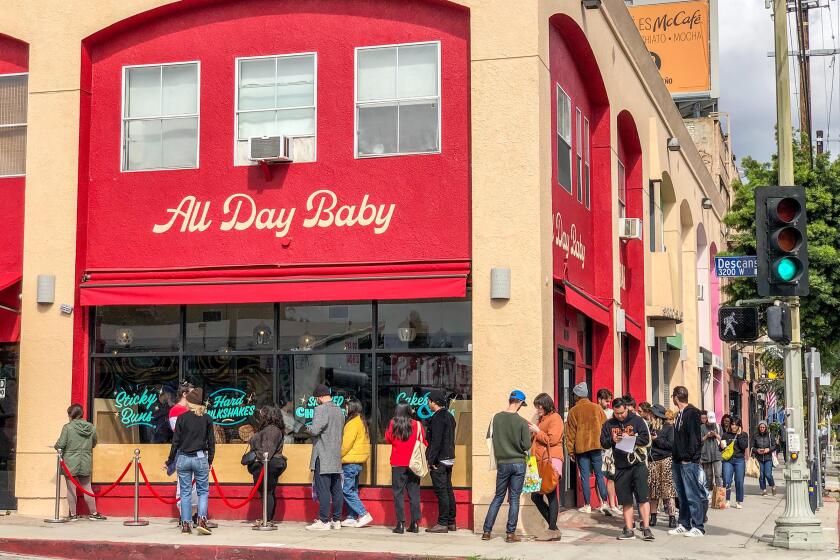New York chews on a plan to ban ingredient
NEW YORK — At the first public hearing on New York’s proposal to prohibit the use of artificial trans fats in restaurants -- an aggressive move by the city’s health commissioner, Thomas Frieden -- dozens of scientists lined up to praise the proposal, and even some restaurant industry representatives agreed that such fats should be phased out over time.
The response seemed to bode well for the artificial trans fat ban, which has not been attempted in any large American city. Among the speakers Monday was an envoy from Tiburon, Calif., an affluent Marin County town that banned artificial trans fat from its restaurants in 2004. Stephen Joseph, who spearheaded the effort in Tiburon, said Frieden was right to opt for a regulatory campaign rather than a voluntary one.
“When you want to get something done, you set a deadline,” he said. “You don’t need foot-dragging, you don’t need negativity.”
If the Board of Health votes in favor of the ban in December, New York restaurants will have 18 months to stop using artificial trans fat, commonly contained in partially hydrogenated vegetable oils, margarines and shortenings as well as many manufactured baked goods. Trans fat is created when food manufacturers add hydrogen to vegetable oil to make it solid. Although trans fat was once recommended as a substitute for animal fats, researchers now believe that they are a leading cause of heart disease.
But many restaurant owners in New York still don’t know what artificial trans fats are, much less how to eliminate them from their cooking, said Louis Nunez, president of the Latino Restaurant Assn. Nunez’s group surveyed 1,000 members and found that 982 of them did not know what trans fats were.
Charles Hunt, executive vice president of the New York State Restaurant Assn., said the lack of education on the issue, “coupled with significant fines, are a recipe for disaster that could be devastating for New York’s restaurants.”
A similar drama played out in Chicago in June, when Edward Burke, a powerful city alderman, proposed banning the use of hydrogenated oils in restaurants. The response was biting, especially from Mayor Richard Daley, who asked, sarcastically, “Is the City Council going to plan our menus?” Burke scaled back his ambitions, first asking to limit artificial trans fats only at large chain restaurants, and then accepting a voluntary program.
New York Mayor Michael R. Bloomberg, by contrast, likes the idea. On Monday he reiterated that support, saying, “The next big health issue is obesity. If you want to do something about it, it’s going to require some decisions. It’s going to require a cost.”
Among Bloomberg’s first acts as mayor, accomplished at Frieden’s urging, was a ban on indoor smoking, which provoked furious opposition from bars, restaurants and smokers themselves. Three years later, the ban is widely viewed as a success, and city officials say the number of smokers in New York has dropped by 200,000.
At the hearing Monday, the only reminder of that earlier uproar came from Audrey Silk, the founder of an organization for smokers’ rights, Citizens Lobbying Against Social Harassment.
“You have invented for public health a role that it never historically had, and it never ought to have,” she said.
“The very language of this law shows the bloodlessness and joylessness of the Health Department’s sterile and medical view of life. Food isn’t medicine. And yet ... you manage to reduce the whole playground of eating ... to the clinical process of ‘food intake.’ ”
The vast majority of speakers, though, had good things to say about the proposed ban. Diane Hes, a professor of pediatrics at New York Methodist Hospital, said childhood obesity had become so widespread in New York that she developed a specialty in bariatric medicine.
Among the children Hes sees in her clinic are some who ask her to write letters to their schools because they are so obese they cannot walk up the stairs to class; others need to be home-schooled because they are sensitive to the ridicule of their peers.
“This is a generation of children who will not outlive their parents,” Hes said. “I can’t tell you how many times a week I hear parents say, ‘If you’re good for your shots, we’ll go get French fries.’ ”
Dariush Mozaffarian, a professor at the Harvard School of Public Health, said artificial trans fats were “the most dangerous ingredient in our diet,” contributing to abdominal weight gain, increasing levels of “bad” cholesterol and worsening insulin resistance. Mozaffarian said consumption of artificial trans fats might account for 6% to 22% of heart attacks in the U.S.
Outside the hearing, under a tent, advocates had organized a small festival under a “Trans Fat Free NYC” banner, complete with potatoes fried in nonhydrogenated soybean oil and a troupe of hip-hop dancers. There was a bag of handmade signs that read, “Trans fats are poison in our food” and “Trans fats are trash.”
Linda Reeves, a holistic health counselor, said the chief question pedestrians asked her was: “What are they?”
More to Read
Eat your way across L.A.
Get our weekly Tasting Notes newsletter for reviews, news and more.
You may occasionally receive promotional content from the Los Angeles Times.









